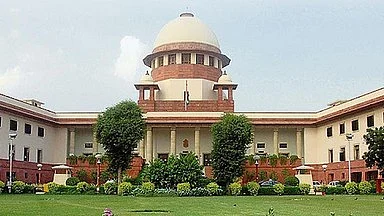Hearing in Presidential Reference concludes, opinion reserved
On day 10 of SC hearing, SG agrees governors cannot sit over Bills endlessly, but opposes timeline laid down by judiciary

Solicitor-general Tushar Mehta on Thursday, 11 September conceded in the Supreme Court that since Article 200 uses the expression "as soon as possible", governors cannot sit on Bills "perennially or for three or four years".
He was summing up the Union government’s stand on the Supreme Court judgment by a two-judge bench on a petition filed by the Tamil Nadu government, laying down a timeline for governors and the President for disposing Bills passed by state legislatures. TN governor R.N. Ravi had withheld his assent to 10 such Bills and, in some cases, sat on them for five years without assigning a reason.
The SG claimed that empirical data suggest that in 90 per cent of the cases, Bills are assented to within a month, and delays are exceptional when the subjects are complex or controversial. Both he and the attorney-general argued that one Constitutional functionary cannot give directions to another, in this case the President or the governors.
In response, Chief Justice of India B.R. Gavai quipped, "Howsoever high one might be, law is above them,” adding that he was a strict believer in the doctrine of separation of powers between the executive, legislature and judiciary.
The Constitution bench comprising CJI Gavai and Justices Surya Kant, Vikram Nath, P.S. Narasimha and A.S. Chandurkar concluded hearing arguments by the Centre and the states on Thursday, and reserved judgment in the reference made by the President of India raising questions related to the timelines for granting assent to Bills. NDA-ruled states opposed the timeline prescribed by the two-judge bench in April, while Opposition-ruled states argued in favour.
During the hearing, the Constitution bench clarified that it was not sitting in appeal over the TN Governor judgment, and that it would only answer the Constitutional questions.
The Union government had argued that the issue of delays by the TN governor should have been referred to a larger Constitution bench and not decided by a division bench of two Supreme Court judges.
Attorney-general R. Venkataramani also argued against the Court fixing timelines for the President and governors for the exercise of their powers under Articles 200 and 201. He added that the Court could not take over the functions of governors.
In the course of the hearing, the Court questioned if governors can indefinitely withhold Bills. If governors can withhold Bills without returning them to the Assembly, it would place an elected government at the whims of the governor, the Court commented. At the same time, the Court also wondered if blanket timelines for the President and governors could be justified merely by isolated instances of delay by one or two governors.
Advocates Kapil Sibal (for West Bengal), Dr A.M. Singhvi (Tamil Nadu), K.K. Venugopal (Kerala), Gopal Subramanium (Karnataka) and Arvind P. Datar (Punjab) argued in support of the timelines and judicial intervention in cases of delays by governors. Harish Salve (Maharashtra), Mahesh Jethmalani (Chhattisgarh) and others argued in support of the Union government opposing a timeline.
States such as Tamil Nadu, Kerala, West Bengal and Punjab had questioned the Presidential Reference on the ground that the questions were already answered in the TN Governor judgment. Instead of the Union government appealing against the judgment of the two-judge bench or filing a review or curative petition, they maintained, it had opted for a Presidential Reference to settle the same question and upturn the judgment delivered by the two-judge bench, which continues to be the law of the land. The Constitution bench reiterated that it was not sitting to hear an appeal against the judgment.
The Presidential Reference containing 14 questions was made in May, a month after the Supreme Court's judgment in the Tamil Nadu governor's matter, in which the Court held that the governor did not act in a bona fide manner in sitting over Bills and referring them to the President after an inordinate delay. In the judgment passed by Justices J.B. Pardiwala and R. Mahadevan, the Court held that the President must act on the Bills reserved for her under Article 201 within three months.
Follow us on: Facebook, Twitter, Google News, Instagram
Join our official telegram channel (@nationalherald) and stay updated with the latest headlines
